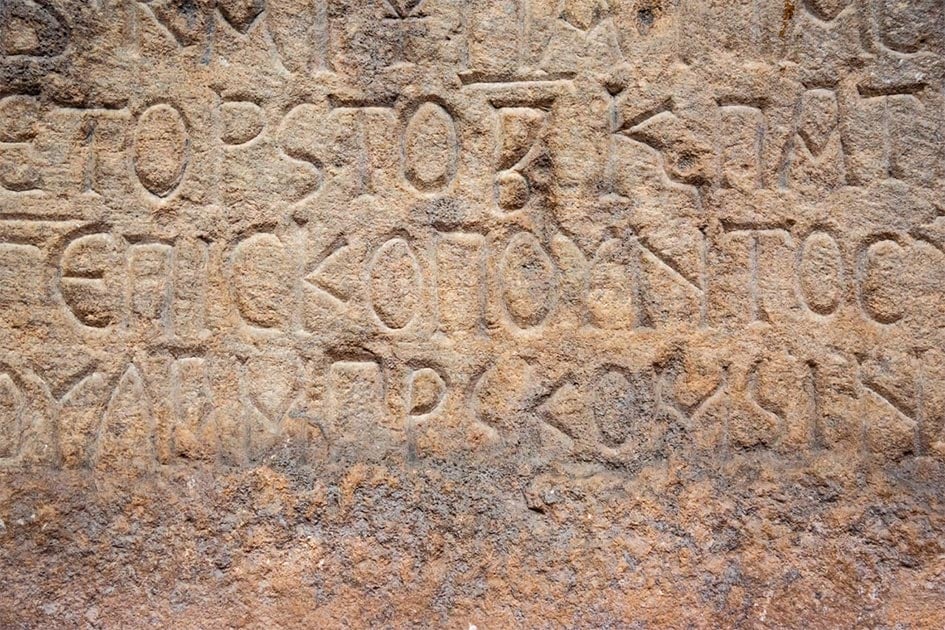Mysterious Brittany Rock Inscription Finally Solved, Revealing Tragic Death
A competition launched to help decipher a mysterious 230 year-old inscription found carved into a rock slab discovered on the Brittany coast has been won, and the code reveals the story of a tragic death at sea.
When one thinks of Brittany in northwestern France the megalithic Carnac stones generally come to mind. More than 3000 prehistoric standing stones form a vast astronomical observatory of stone rows, dolmens (stone tombs and burial mounds) and single towering menhirs (standing stones), erected at some stage during the Neolithic period, with some estimated to have been risen as early as 4500 BC.

The Carnac stones at Brittany. (Steffenheilfort / CC BY-SA 3.0)
The Stone With the Mystery Inscription
A much smaller stone, with an infinitely more complicated nature, that was only accessible at low tide was discovered three years ago in a cove in Brittany and this meter-high slab bears 20 lines of inscription. According to a recent report on the BBC the years “1786 AD and 1787 AD” are carved on the stone which dates the inscription to a few years before the French Revolution.
Furthermore, a ship and a heart are surmounted by a carved cross and adding to this mystery inscription alongside lines of normal French letters others were orientated upside-down, and there are even some Scandinavian-style Ø letters present.
2000 History Sleuths Stood Forward
According to a report in RFI, “The contest spread around the world on social media,” said Véronique Martin, a member of the council, from the village of Plougastel-Daoulas in Brittany, who came up with the idea of holding a competition to crack the inscription. Martin said the competition mainly attracted “treasure hunters, and people who are passionate about research and solving mysteries”.
After announcing the contest in May she received “2000 queries” and her office sent out 600 application forms within the first six weeks of the contest. The mystery writing, that defied all attempts at interpretation by local academics, was thought by many to be old Breton or Basque, and that the person who wrote it may only have been semi-literate. A May 2019 BBC article said the letters may “relate to the sounds of words” as the writer heard them.

The Brittany Rock inscription contains old Breton writing. This image shows old Breton and French side by side. (Luzmael / CC BY-SA 4.0)
In one section the letters read: “ROC AR B … DRE AR GRIO SE EVELOH AR VIRIONES BAOAVEL” while another says: “OBBIIE: BRISBVILAR ... FROIK … AL”. One theory was that the inscription related to the building of a fort and gun emplacements to protect the Bay of Brest, near to where the stone was found. But now, the stone has been successfully translated by two sleuths and the inscription turns out to record a tragic death at sea.
The Mystery Ship That Stole A Heart
An article in the Jerusalem Post reports that “61 completed translations” were submitted in the competition. Most entries came from France but contestants entered from the US and as far as Thailand.
A panel of historians judged all the entries and declared “two winning theories” were the most plausible interpretations. Mayor Dominique Cap says the two translations that were forwarded differed slightly, but the resulting stories were “very similar” and both winners concurred that the inscription was a remembrance of a man who had died at sea.
- The Outstanding Megalithic Necropolis that is the Tumulus of Bougon
- Extensive Study Claims Stone Age Sailors Spread the Concept of Megalithic Sites Like Stonehenge
- Ten Mysterious Undeciphered Codes and Inscriptions

The Brittany Rock inscription tells of man who died at sea. (olandsfokus / Adobe Stock)
Noël René Toudic, an English teacher and Celtic language expert, said he worked on the stones message on the assumption that the writer was a semi-literate man speaking 18 th century Breton and his translation reads:
“Serge died when with no skill at rowing, his boat was tipped over by the wind.”
Historian Roger Faligot and artist Alain Robet submitted the other translation which they also claimed was written in Breton, but they believe some of the words were written in the Welsh language, and their translation reads:
“He was the incarnation of courage and joie de vivre. Somewhere on the island he was struck and he is dead.”
These two winning entries will split the $2,169 (€2,000) (£1,679) prize money and Mayor Cap said there was still a long way to go to “completely solve the mystery” but he described the result of the competition as a “big step forward,” according to the BBC.

Brittany coast line where the Brittany Rock inscription denotes a tragedy. (453169 / Public Domain)
Top image: Representation of the ancient inscription on Brittany Rock. Source: Denis Rozhnovsky / Adobe Stock.
By Ashley Cowie


















Comments
And of course, everyone was literate in the 18th century. If its an Brittonic language, theres 3, theres 1 between Wales and Brittany and these and the Breton fishermen would regularly collude with one another as they’re both other sides of the Channel.
In Anglia et Cornubia.
Is this a hoax? Fake article? My French is pretty bad, but if you read that in modern French it appears to be graffitti. Some bloke called Jean asking his mate Hermes if he is Ok and Hermes saying, Fine ta, How are you? Just like a modern day email in fact! Don’t know where they got the boats and the rest of it from!
wow, the two "translations" don't sound similar at all. in fact they seem like they were just totally made up out of thin air, so I have no idea how the "experts" determine winners or what is most accurate.
Pretty cool